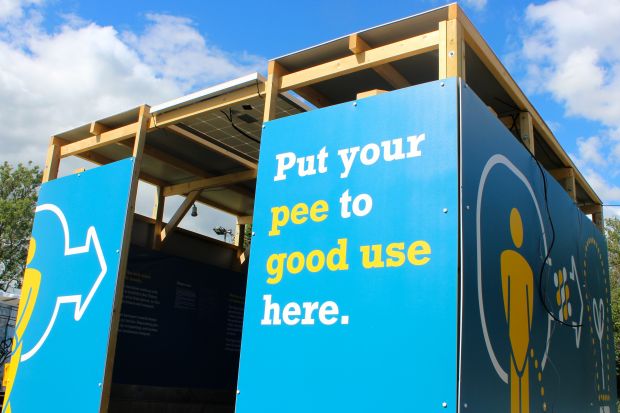The Glastonbury festival takes place this weekend, and toilet arrangements will be on many festival-goers’ minds.
While some will not give too much thought to where they empty their bladder, researchers from the University of the West of England are inviting festival audiences to put their urine to good use by providing “fuel” for their Pee Power (or "urine-tricity") project, which is being showcased at the Somerset event.
The project, led by the Bristol BioEnergy Centre at UWE, offers people the chance to relieve themselves in a specially adapted urinal, which collects the urine and uses it to “feed” microbial fuel cells, visible through clear plastic containers. The urine is in turn used as a biofuel that generates enough electricity to light up the urinal.
“Festival toilets have always been a talking point but the pee power unit shows how all that urine can be put to good use as a bio-fuel,” said Ioannis Ieropoulos, director of the Bristol BioEnergy Centre. “We are keen to share how the technology works and to develop its potential for use in a wide range of sites.
“The microbial fuel cells are like batteries that do not run out, since they can use urine as a fuel for direct electricity generation, which is done by live bacteria consuming urine for their growth and maintenance.
“The MFC technology is in effect a system that taps a portion of that biochemical energy used for microbial growth, and converts it directly into electricity. This technology can utilise any form of organic waste and turn it into useful energy, without relying on fossil fuels, which is something that renders the MFCs green and beneficial to the society.”
UWE is also exploring how a portable water treatment plant might help improve water sustainability by reducing the huge water footprint at a future festival. The two projects are being developed to improve lives in refugee camps in areas suffering the consequences of environmental disaster and war zones, as well as global off-grid locations that do not have sanitation or electricity infrastructure.
“I'm sure it will come as a relief to festival-goers to know they are contributing towards a brighter future,” said Andy Bastable, head of water and sanitation at Oxfam, which is a partner in the project along with garden buildings company Dunster House.
The special throne can be found in the Sacred Space field, along with an educational stall explaining the ideas and the technology behind the project.
Register to continue
Why register?
- Registration is free and only takes a moment
- Once registered, you can read 3 articles a month
- Sign up for our newsletter
Subscribe
Or subscribe for unlimited access to:
- Unlimited access to news, views, insights & reviews
- Digital editions
- Digital access to THE’s university and college rankings analysis
Already registered or a current subscriber? Login





